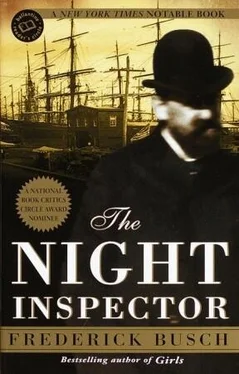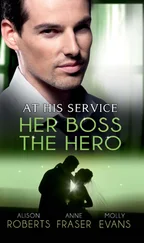Then he stopped. A long sigh whispered out, and he was done. And who is to say that lovers who collapse away from one another in their gluey juices and whisper their sighs out and out, are so dissimilar from that sorry, frightened animal whose life I took as if I had a right to?
I took my position, in the garden, under a trellis hung with last year’s bean vines, my fingers sticky with the old fellow’s blood and the alluvial smell of his fur in my nose. I sat sideways to the house, my legs crossed at the ankle, and I leaned my left elbow on my left thigh, near the knee. It gave my back a crook, but moving to relieve it might render the crook permanent, for although the moon was a thin crescent, there was enough light for a man, sufficiently alert, to pick me out — to pick me off. Crawling slowly, I had dragged the old fellow’s corpse, a sack of bone and suet now, into the garden; I had thought to shoot with the Sharps braced on his bony flank, but I could not, and he lay behind me, redolent of disquiet and stink. Doves made low, wailing sounds, and something thrashed to the rear of the garden near the trees, then abruptly stopped, and I crouched in case the passage of men had silenced what I thought might have been an owl with a mouse. Nothing came, nobody approached, the dog’s corpse cooled, and I watched the windows at the back of the house.
I might have slept. I would have sworn not. But I could remember thinking nothing more since the sound in the woods. And then the light came on upstairs, in the window where I’d seen someone, while it was day, setting what seemed to be glasses and a decanter on a surface just below my angle of vision. I wondered what sort of mind a cartographer possessed. Like me, he was in the occupation of seeing. We looked and looked; we somehow took hold of what we saw; and he drew lines while I fired along the lines I sensed but did not render; what we saw we owned. And there, at once, was W, wearing a shirt the color of nutmeg, and linen trousers in a rather ferocious tone of yellowish gold. His belly pushed at his shirt and his belt line. I could see, using my telescope, the dark, thick hair on the back of his hands and even his fingers. One hand was at the decanter I had seen earlier, and then, before it could grip, it was seized by the smaller, more slender hand of someone else. I had not shot a woman thus far.
She leaned forward to kiss the coarser hand, and then I did sit up from my shooter’s crouch because it was a smaller man who kissed the hand, a fellow with muttonchops and thick mustache. He kissed the mapmaker’s hand and he nibbled at his fingers. When they laughed, it was with the deep voices of manly fellows who appreciated a jest. The mapmaker leaned to kiss the smaller man at the bridge of his nose and then on the tip of the nose itself. He was going to kiss the mouth, and I closed the eye that peered through the telescope, but then I opened it. I had not seen quinces at play before, although I had known boys at Yale who were said, because of the way they carried themselves or with whom they were thought to sport, to be epicene. W and his bugger nibbled each other’s lips and were framed in the window like a painting of perversity, although it is open to question just which party, at which end of the shooter’s line of sight, was perverse. I aimed the rifle, and therefore I was the legislator of the night’s morality. I killed the cartographer and had a linen cartridge in, and a cap in place, as the glass of the windowpane exploded outward, seemingly, an instant after his head erupted toward the ceiling of the room. There was neck and jaw, an ear, I think, and a geyser of blood, brilliant in the light of their lamp, and then I had the littler catamite inside my telescopic sight, and then I planted the shot inside his ear. He fell from sight while blood still pulsed upward from the earlier shot. Before I took him, his expression was studious: He seemed to examine, with as much curiosity as disbelief, the disintegration before him.
I petted the old dog a couple of times, to apologize, before I started to crawl through the rank garden and make my way back. I smelled the dog on my hands and clothing, and I made a note to find a laundress or a Negro soldier who would clean my clothes. Wander the perimeters in a cloud of odor such as this, and be taken off the first strong wind by a Confederate marksman with even a fair sense of smell. When I reported to Sergeant Grafton, he drank at his bitter coffee and poured some for me. We sat in the dark, near the horses, and I ate some cold rabbit they had saved for me.
“Would you have shot him if — that is, would you have shot the woman if she’d been one?”
“No.”
“Then why the man? Perversions aside?”
“You think it perverse?” I asked.
“I plow a different row,” the sergeant said. “We can leave it at that.”
“All right.”
“And you?”
“Women, thanks.”
“Thank Christ,” he said. “And you’d not have shot the woman.”
“Obviously.”
“Oh. I see. You’re … scrupulous.”
“I’m not a murderer.”
“Yes, you are.”
“No, Sergeant. In wartime, you shoot soldiers and, I don’t know, mapmakers, and horse dealers and merchants, if need be. But you do not shoot women.”
“I’ll remember that,” the sergeant said, “and with gratitude for the advice. But why, pray tell, did you shoot the rimadonna’s boy?”
“Who was to say which end of the buggery our fellow was on? They directed us to his house. They told us that his wife was dead, or fled. You may guess which. They told me he had a lot of dark hair, that in the district farmers said he had more pelt than his dog. Neither man was bald. I couldn’t tell. I—”
“You appeared in the whirlwind and you took them off.”
“I did my work.”
“So it’s work, is it?”
“The production of death, Sergeant, is a type of work.”
He poured some coffee onto the ground and stood slowly as if stiff in the back or legs. I tended to avoid his eyes because they were of a very light blue, an almost eerie, icy pallor, and he seemed to be staring hard at you even if, in fact, he was only being attentive.
“You have to pardon me,” he said, “as I must pardon you. There’s an awful odor about you. I have to believe it is physical, and not a moral decay, but you might see to it, Mr. Bartholomew.”
“I’m grateful you pointed it out,” I said. “I killed a dog lest he raise the alarm. I used a knife, and I hacked my way into his bowel, I fear.”
“The place, that is, where you did your work. The bowel of a dog.”
I know I would have riposted, but I remember nothing more, and I wakened hours later. I believe that I fell asleep sitting and uncovered by any blanket but the stench and blood I had carried home from the job.
And I am trying to say that you could feel the city coiling itself. In Manhattan, you could feel the national effort begin. Early in the day, when I might have been about for hours, when the ice wagons and scissors grinders and ragmen began to drive their rounds, then the sound came up of the iron of the horses’ hooves, the thunder of the wooden and metal-rimmed wheels, the creak of springs and chime of harness bells and the cries of vendors and drovers, the sweet reek of the honey wagon rising with the industrial salts, the smoke of fires of wood and gas and coke, and the cries of children on roofs and stoops, the wails of women and small men (for it was a place in which to be strong, or championed, or fleet of foot). The din was what I daily heard over the streets and rivers and the canals of Brooklyn, which I had walked beside — shriek of whistle, scream of wounded creature, the ponderous friction of loading pallet on dock or rail, the immense, deep roar of limestone pouring, and the clatter of the shunting in the switchyards. And, over everything, the stink turned into smoke of a hundred kinds, and, past it, like a promise, visible upon occasion in the soot-streaked sky, especially near the Hudson or the East, a blue-white pallor, and the sun. This polluted energy, this vastness on a small island, was the national beginning of a new lunge toward — what? I did not know. The resources were in place, and the drive to use them was pulsing. Just so with my new friend.
Читать дальше












